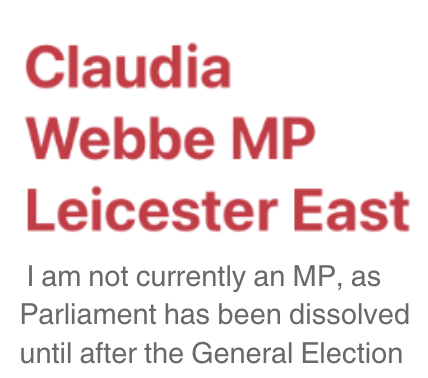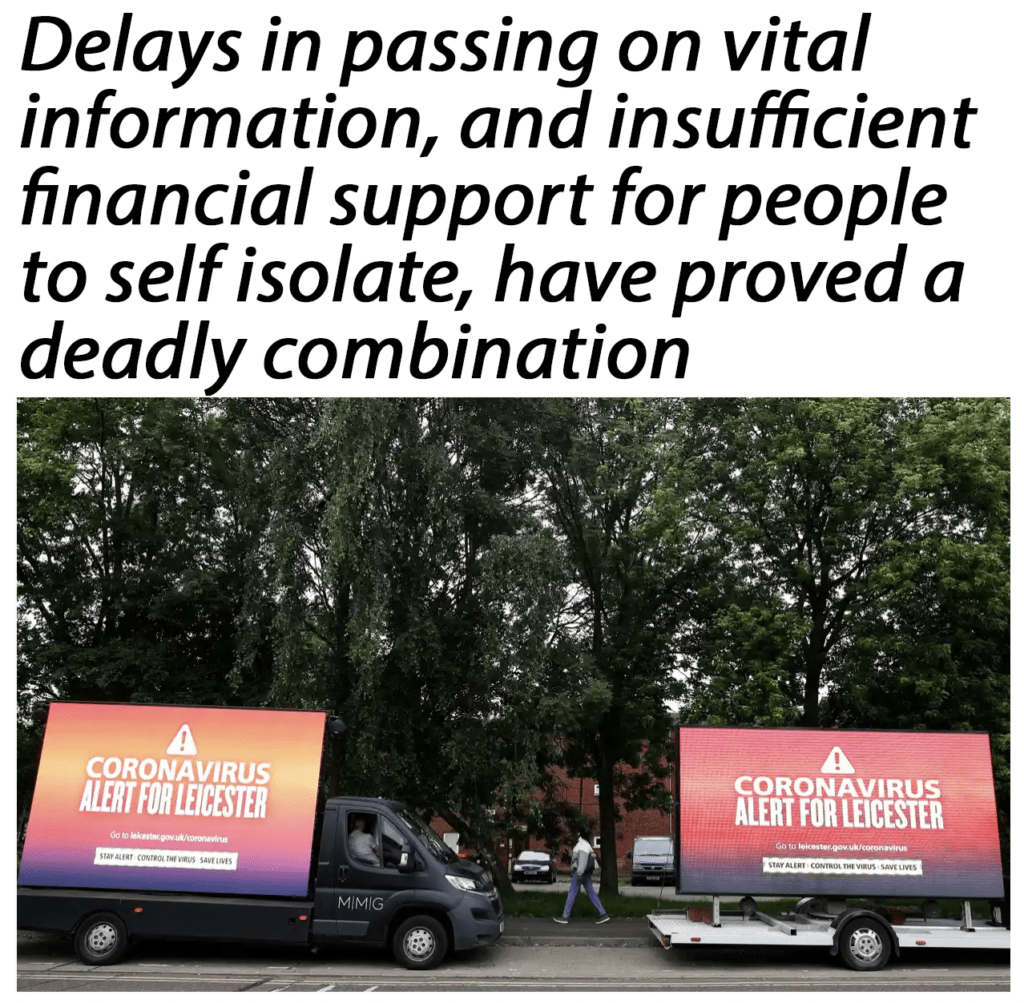The government errors that led to Leicester’s Covid-19 spike are clear to see.
By Claudia Webbe MP
Delays in passing on vital information, and insufficient financial support for people to self isolate, have proved a deadly combination.
Like many Leicester residents, I have been extremely concerned by the spike of coronavirus cases in my home city. I understand how difficult it will be for members of our community to see the rest of the country eating in restaurants and going to the cinema. Yet at a time of unprecedented upheaval, it is important that lives and public health are prioritised above all else, and I welcome the extension of lockdown measures.
Like many of my constituents, I am also concerned that many of the worst affected areas are in Leicester East. (Six out of the seven wards in my constituency were in the top 10 worst affected – with North Evington recording the highest rate.) Like everyone else, I am also concerned about my vulnerable relatives and loved ones who will have to remain shielding.
Yet I wholeheartedly reject those seeking to blame Leicester residents and particular communities for this outbreak. The Public Health England (PHE) preliminary inquiry found that there are a multitude of factors behind Leicester’s increase in coronavirus cases. This reinforces what we already know: that we must not focus the blame inwards towards our varied black and minority ethnic communities.
Leicester’s diversity is our strength. Yet we know that racial and class inequalities, coupled with inadequate government support, mean that working-class people, migrants and minority ethnic communities are at greater risk both of being exposed to Covid-19, and suffering its worst effects. As Leicester East is one of the most ethnically and culturally diverse places in the UK, and has high levels of in-work poverty, we disproportionately suffer from these issues. The virus itself may not discriminate, but our economic and social system certainly does.
At every step in this crisis – from lockdown delay, equipment shortages, care home neglect, testing delays, insufficient data and much more – the government has failed to adequately protect our communities.
Sadly, when it comes to localised outbreaks, the government has not learned from its repeated national failures. PHE’s report lays bare the government’s slow and ineffective response to the situation in Leicester. And as the British Medical Association council chair ,Dr Chaand Nagpaul, recently argued, without the long-promised test and trace app and up-to-date local data, future local spikes remain likely.
The infection rate recorded in Leicester from pillar 2 testing (tests for the wider population carried out at drive-through centres or through home testing) was more than four times higher than the average for England. Yet this information was not provided to Leicester’s health departments for 11 days – an unacceptable delay that hindered our local response. The government cannot repeat this shocking lack of communication in future outbreaks.
Of Leicester’s 3,216 cases, almost a third, 944, were diagnosed in the past fortnight. This suggests that the government’s premature relaxing of lockdown and confused messaging may have contributed to the spike in cases. The clarity of “Stay at home, protect the NHS, save lives” has been replaced with a confusing blend of gung-ho optimism and public admonitions.
The PHE study also found that many of the reported Covid-19 incidents are related to food factories and outlets, and that the average age of those infected is around 40. This suggests that too many working people in Leicester were given inadequate government support to self-isolate – something borne out by recent reports of outbreaks of the virus in garment factories. This reflects my experience, as I have been helping countless local businesses and employees to stay afloat and access funding by navigating the government’s prohibitively strict guidelines.
With Leicester required to maintain lockdown measures, it will be necessary for economic support to be extended and expanded. It is crucial that families in Leicester East, and in any future areas which suffer a spike, can afford to stay safe during the continued lockdown.
Even before the coronavirus hit, the Conservatives had presided over a decade of cuts to essential services while providing tax cuts for the wealthy, during which they allowed poverty and homelessness to rise, and facilitated a transfer of wealth from the poorest to the richest while scapegoating the most vulnerable people. In February, before the coronavirus hit, 14 million people in the UK were living in poverty – including 30% of all our children.
It is impossible for impoverished people to comply with guidance on self-isolation and social distancing. It is therefore not just morally imperative, but in the best public health interest of everyone in our country that people’s basic needs are met.
The prime minister has recently taken to bizarrely describing the government’s approach to local outbreaks as a “whack-a-mole” strategy. Yet this may be an uncharacteristically honest assessment. Whack-a-mole, an old fairground game, is purely reactive and impossible to successfully plan for.
As we go forward, the government must learn the lessons from its mismanagement of Leicester’s spike in coronavirus cases. That means acting now to prevent the further impoverishment of working people and their families. And it means abandoning its cavalier approach for a more strategic, preparation-focused method that prioritises public safety amid any future local outbreaks.



